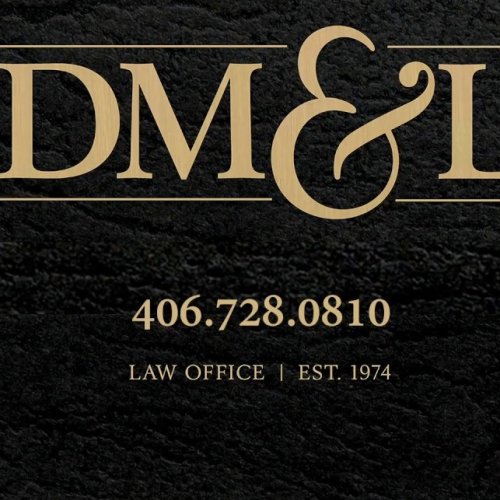Best Bankruptcy Lawyers in Montana
Share your needs with us, get contacted by law firms.
Free. Takes 2 min.
Or refine your search by selecting a city:
List of the best lawyers in Montana, United States
About Bankruptcy Law in Montana, United States
Bankruptcy law in Montana provides individuals, families, and businesses with legal options to address overwhelming debt. Bankruptcy is a federal process governed mainly by the United States Bankruptcy Code, but certain procedures and exemptions are adapted to local Montana law. Bankruptcy is designed to help honest debtors get a fresh start by either eliminating their obligations or restructuring payment terms under court supervision. There are several types of bankruptcy, with Chapter 7 and Chapter 13 being the most common for individuals in Montana.
Why You May Need a Lawyer
Bankruptcy can be a complex legal process with significant consequences for your financial future. You may need a lawyer if you:
- Are unable to pay your debts and face creditor harassment, wage garnishment, foreclosure, or repossession
- Own significant assets or valuable property that you wish to protect
- Are self-employed or operate a small business with complicated finances
- Are not sure if you should file for Chapter 7 or Chapter 13 bankruptcy
- Need help understanding which of your assets are exempt under Montana law
- Are concerned about how bankruptcy will affect your credit, housing, or employment
- Have previously filed bankruptcy or have other legal actions pending
- Are confused by bankruptcy paperwork, legal forms, or court procedures
- Need assistance negotiating with creditors or representing you in court
A qualified bankruptcy attorney can help you avoid common pitfalls, protect your rights, and guide you through every step of the process.
Local Laws Overview
While bankruptcy follows federal law, Montana residents must adhere to specific state rules, particularly with regard to exemptions. Some key local considerations include:
- Exemptions: Montana residents can only use Montana’s state exemptions (not federal), which define what property you can protect in bankruptcy. Examples include exemptions for your homestead, personal property, vehicles, and retirement accounts.
- Means Test: Eligibility for Chapter 7 bankruptcy is determined by the means test, which compares your income to the median for Montana households of your size. If your income is too high, you may need to file under Chapter 13.
- Bankruptcy Courts: Cases are handled by the United States Bankruptcy Court for the District of Montana, with locations in Billings, Butte, Great Falls, and Missoula.
- Montana Residency Requirements: You must have lived in Montana for at least 180 days before filing and for at least 730 days to use Montana’s exemptions.
- Alternative Debt Relief: Bankruptcy may not discharge certain debts, such as recent taxes, child support, or student loans.
Understanding Montana's specific rules is vital for protecting your rights and assets throughout the bankruptcy process.
Frequently Asked Questions
What types of bankruptcy are available in Montana?
Chapter 7 (liquidation) and Chapter 13 (reorganization) are most common for individuals, while businesses may use Chapter 11 or Chapter 12 (for family farmers and fishermen).
How do I qualify for Chapter 7 bankruptcy in Montana?
You must pass a means test based on your household income compared to the Montana median. Those with higher incomes may need to file Chapter 13 instead.
What property can I keep if I file bankruptcy in Montana?
Montana law provides “exemptions” for certain property including a portion of your home equity, vehicles, household goods, personal items, and specified retirement accounts.
Will bankruptcy wipe out all my debts?
Bankruptcy can discharge most unsecured debts like credit cards and medical bills but generally will not discharge student loans, most taxes, child support, or certain court fines.
How does bankruptcy affect my credit score?
Bankruptcy may lower your credit score and remain on your credit report for up to ten years, but it also gives you a chance to rebuild your credit over time.
Can creditors continue to contact me after I file bankruptcy?
No. Once you file, an "automatic stay" goes into effect which prevents most collection actions, including phone calls, lawsuits, wage garnishments, and foreclosures.
Do I have to go to court in Montana for bankruptcy?
You will usually need to attend a meeting of creditors, known as a 341 meeting, held by the trustee. A formal court appearance may be required in some cases.
How long does the bankruptcy process take in Montana?
A typical Chapter 7 case takes about three to six months. Chapter 13 cases involve repayment plans that last three to five years.
Will I lose my home or car if I file for bankruptcy?
Montana's exemptions may allow you to keep your home and car if you are current on payments and equity levels do not exceed exemption limits.
Can I file bankruptcy without an attorney in Montana?
Yes, you can file “pro se,” but bankruptcy law is complex. Even minor mistakes can lead to case dismissal or loss of property. Consulting an attorney is strongly recommended.
Additional Resources
If you are considering bankruptcy in Montana, these resources can help:
- United States Bankruptcy Court for the District of Montana - Guides on filing, forms, and court locations
- Montana Legal Services Association - Free or low-cost legal assistance for qualified individuals
- State Bar of Montana - Lawyer referral services and legal information
- Montana Department of Justice - Resources on consumer protection and legal rights
- Credit counseling agencies approved by the Department of Justice - Required for most bankruptcy filers
Next Steps
If you are overwhelmed by debt or considering bankruptcy, consider the following steps:
- Gather your financial records, including debts, assets, income, and recent tax returns
- Contact a local bankruptcy attorney to discuss your options and rights under Montana law
- Attend approved credit counseling as required by law before filing
- Review Montana’s exemptions and court procedures with your attorney
- Prepare all necessary paperwork and file your bankruptcy petition with the United States Bankruptcy Court for the District of Montana
- Attend the required meeting of creditors and follow all trustee and court instructions
Navigating bankruptcy is stressful, but you do not have to do it alone. With knowledgeable legal advice and a clear understanding of Montana laws, you can make smart choices and work toward financial recovery.
Lawzana helps you find the best lawyers and law firms in Montana through a curated and pre-screened list of qualified legal professionals. Our platform offers rankings and detailed profiles of attorneys and law firms, allowing you to compare based on practice areas, including Bankruptcy, experience, and client feedback.
Each profile includes a description of the firm's areas of practice, client reviews, team members and partners, year of establishment, spoken languages, office locations, contact information, social media presence, and any published articles or resources. Most firms on our platform speak English and are experienced in both local and international legal matters.
Get a quote from top-rated law firms in Montana, United States — quickly, securely, and without unnecessary hassle.
Disclaimer:
The information provided on this page is for general informational purposes only and does not constitute legal advice. While we strive to ensure the accuracy and relevance of the content, legal information may change over time, and interpretations of the law can vary. You should always consult with a qualified legal professional for advice specific to your situation.
We disclaim all liability for actions taken or not taken based on the content of this page. If you believe any information is incorrect or outdated, please contact us, and we will review and update it where appropriate.
Browse bankruptcy law firms by city in Montana
Refine your search by selecting a city.










